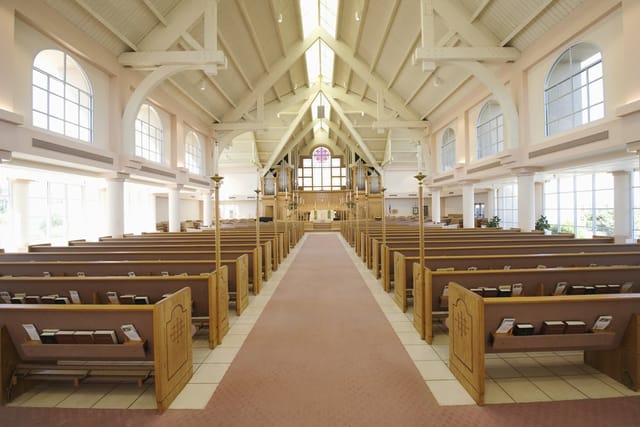People are leaving church in droves, and it’s not because they’re too lazy to get up on Sunday mornings. The truth is, the church has some serious soul-searching to do if it wants to stay relevant and meaningful in today’s world. Here are 15 blunt reasons people are saying “thanks but no thanks” to church these days. Buckle up because this might sting a little.
Church feels irrelevant to modern life.

Many people feel like the church is stuck in the past, talking about issues and ideas that just don’t resonate anymore. They want guidance for navigating relationships, careers, mental health, and the challenges of the 21st century, not outdated rules and rituals. If church doesn’t adapt to stay relevant, more and more people will leave it behind, Christianity Today notes.
You may also like: Don’t Share These 15 Things With Anyone — They’re Nobody’s Business But Yours
Judgmental attitudes push people away.

No one likes feeling judged. But too often, that’s exactly how church makes people feel — looked down on for their lifestyle, beliefs, doubts, or past mistakes. That holier-than-thou vibe is a huge turnoff. If church wants to keep people engaged, it needs to lead with radical acceptance, not judgment and shame.
Don’t miss out – follow Bolde for exclusive content daily
Sermons are boring and repetitive.

Let’s be real — many sermons are a snooze fest. Same basic messages recycled week after week, delivered in a dry, preachy style. Yawn. If pastors want to hold people’s attention, they need to find fresh, engaging ways to share timeless truths. Mix it up, keep it real, and ditch the clichés.
You may also like: 18 Personality Traits Of An Unhappily Married Man
Church politics and drama are a drag.

Sadly, church can have more politics and gossip than a reality TV show. Cliques, power plays, people jockeying for influence — it’s exhausting and distracting from what really matters. No wonder people peace out when church feels more like a popularity contest than a place of authentic community.
Don’t miss out – follow Bolde for exclusive content daily
There’s a lack of real community and connection.

Many people crave deep, genuine friendships. But too often church interactions feel surface-level and impersonal, just a quick “hello” and handshake on Sunday. If churches want to foster real community, they need to create space for people to open up, support each other, and do life together beyond just a quick weekly check-in.
You may also like: 16 Signs You Didn’t Get Enough Affection As A Child
Hypocrisy turns people off.

No one’s perfect, but blatant hypocrisy is hard to stomach. When church leaders preach one thing but practice another, it breeds cynicism and mistrust. Folks can smell fakeness from a mile away. If churches want to earn respect, they need to walk their talk and lead with integrity and humility.
Don’t miss out – follow Bolde for exclusive content daily
There are limited opportunities to serve and make a difference.

Many people today want to be part of something bigger than themselves. They want to roll up their sleeves, get involved, and make a real impact. But too many churches limit people’s participation to just sitting and listening. If churches want passionate volunteers, they need to empower people to serve in meaningful ways that match their gifts and interests.
You may also like: How A Narcissist Acts When They Can’t Fool You Anymore
There’s too much pressure to conform and fit in.

No one likes feeling like they have to be someone they’re not just to belong. But many churches have an unspoken dress code, lingo, and set of acceptable behaviors. It can feel stifling and inauthentic, like you can’t just relax and be yourself. If churches want to attract people from all walks of life, they need to celebrate individuality, not force everyone into the same cookie-cutter mold.
Don’t miss out – follow Bolde for exclusive content daily
They have exclusive attitudes towards doubters and skeptics.

We all have doubts and questions sometimes, Christianity.com acknowledges. But in many churches, expressing uncertainty is taboo. Asking tough questions is seen as a lack of faith. This leaves people feeling like they either have to pretend to have it all together or just keep their mouths shut. If churches want to welcome seekers, they need to make space for honest wrestling and create a culture where it’s okay to not have all the answers.
You may also like: 15 Things To Keep To Yourself Because They’re Nobody’s Business But Yours
There’s an overemphasis on money and giving.

No one likes feeling guilted or pressured into giving. But too many churches seem fixated on money, constantly passing the plate and pushing people to tithe. It can feel like the church cares more about your wallet than your soul. If churches want to inspire generosity, they need to focus on joy-filled stewardship, not obligation or manipulation.
Don’t miss out – follow Bolde for exclusive content daily
The lack of diversity and inclusivity is off-putting.

When you look around on a Sunday morning and everyone looks, thinks, and votes the same, it can start to feel more like a country club than a church. But the gospel is for all people, regardless of race, class, or political party. If churches want to reflect God’s heart for the world, they need to intentionally cultivate diversity, have tough conversations, and create a culture where everyone feels welcome and valued.
You may also like: How A Narcissist Acts When You Start Seeing Through Their BS
There’s irrelevant or lackluster worship music.

Let’s be honest, a lot of church music is just plain bad. Dated styles, clunky lyrics, half-hearted singing. It can feel more like a chore than a joy. But worship should be engaging and meaningful, not something to endure. If churches want to help people connect with God, they need to put some thought and passion into crafting a worship experience that resonates with people’s hearts and minds.
Don’t miss out – follow Bolde for exclusive content daily
There’s a lack of authenticity and vulnerability from leaders.

People don’t want perfect leaders, they want real ones. When pastors and church staff put on a facade and pretend to have it all together, it creates distance and mistrust. But when leaders are honest about their own struggles, doubts, and failures, it opens the door for genuine connection. If churches want to cultivate authenticity, it has to start from the top.
You may also like: People Who Had Unhappy Childhoods Usually Develop These Traits
Failure to address real-world issues and injustices doesn’t inspire faith.

It’s not enough for churches to just preach personal piety. People want to see the church get its hands dirty, standing up for the oppressed and working to make the world a better place. When churches stay silent on issues of racism, poverty, and injustice, it feels like a betrayal of the gospel. If churches want to be relevant, they need to be engaged in the struggles and concerns of the world around them.
Don’t miss out – follow Bolde for exclusive content daily
Shifting cultural attitudes and competing priorities are a thing.

Let’s face it, church is no longer the center of social and community life like it used to be. People have more options and demands on their time than ever before, from kids’ sports to social media to Sunday brunch. In an increasingly secular culture, church is just one choice among many. If churches want to compete, they need to offer something truly compelling and life-giving, not just guilt people into showing up out of obligation.
Enjoy this piece? Give it a like and follow Bolde on MSN for more!


